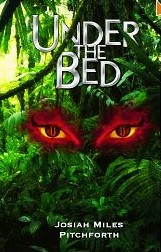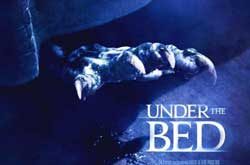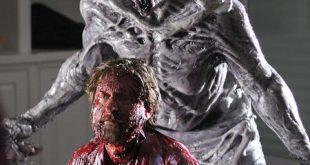Publication Date: November 2010
Price: n/a
It’s where you sleep. It’s where you dream. And beneath it all is a destination you will never forget! For Dan and Theresa, what starts out as a troubling encounter with the supernatural turns into a journey that will unlock the secrets of sex, love, and humanity . . .
Dan and Theresa are a young couple trying to figure out where their lives are going. Dan works in a tollbooth, Theresa in a flower shop, and neither is quite sure what the future has in store for them or their relationship. While they try to figure out if they are really in love and if they are really meant to be together, they find themselves visited by a very unexpected houseguest – a real life monster under the bed. Is this all just a dream, are they going insane, or is it possible supernatural boogeymen really do exist? The first to truly acknowledge the horrifying reality of the situation, Theresa reaches for outside help but puts her trust in the wrong people. And Dan learns some long-held family secrets that shed light on his connection to Theresa as well as to a place only found in dreams.
“Under the Bed” may have a beginning, middle, and end, and a basic plotline, but it isn’t quite a novel yet. It is a concept for a novel. It wants very much to be a novel, and there are moments where it is almost there. But there is a reason that published novels go through such a long and arduous editing process. As much as it might pain an author to have someone rip their story into tiny little pieces and poke and prod and manhandle it, in the end that editing ‘violence’ leads to the creation of something that is readable and hopefully enjoyable. As “Under the Bed” stands in its current state, reading it was more of a chore than a pleasure.
At the basic, nuts and bolts level, there were punctuation, grammar, and word usage mistakes on just about every page. Names changed in their spelling between paragraphs, commas danced in and out of quotation marks, and the tense couldn’t seem to make up its mind what it wanted to be. And the over-abundance of similes was almost mind-boggling. They were everywhere, starting out chapters, filling up paragraphs, dragging down almost every descriptive sentence in the book. In fact the over-usage of similes was like wearing too many layers of clothing on a hot summer day – stifling and annoying and kind of ridiculous. I enjoy a well-crafted and well-placed simile as much as the next guy, but they can very easily be over-used as a descriptive device, which obviously happened here.
That is not to say, however, that this book was a complete mess. In fact there were some really brilliant bits of dialogue and even some really clever descriptions used, as well as one perfectly written chapter (Chapter 38, in case anyone was wondering). That one perfect chapter was so well written, actually, that it stayed with me long after I had finished reading the rest of the story. The author has a knack for stilted, awkward dialogue, and that one chapter was almost entirely an interaction between the main characters that played out in that fascinating awkwardness. If the author could go back and get the rest of the chapters up to the standards set by that perfect chapter, he might have a real novel on his hands. At least as far as the writing is concerned, at any rate.
Because at the level where this is supposed to be a story and it is supposed to be something that audiences will want to read, it fails once again. To begin with, the two main characters are hard to like. They are morose and sad and don’t even seem to like themselves or each other most of the time, so it was hard for me to see a reason to like them either. Dan was unfriendly and aimless, Theresa was nagging and strange. I felt no connection or empathy with them; it didn’t matter to me whether they stayed together or broke up, whether they were killed by the monster under the bed or robbed by scam artists. And for a story that basically revolved around just those two characters, it was important that I, as the reader, care about them. But I didn’t. They were not strong enough or likable enough to carry the story for me. The few other people that were introduced floated around in the background, having moments in the spotlight when it would advance the story, but then having their own mini-plotlines ultimately go nowhere. If they were important more attention should have been paid to them, and if they were really as unimportant as it seemed, less attention should have been given to introducing them with long-winded paragraphs about their backgrounds. I don’t need to know that the local lawman had a supernatural experience when he was younger if he isn’t going to play a real part in the supernatural experience going on now. I don’t care that the scam artist is wanted in connection to a string of violent crimes if he is going to get killed just moments into his scene. And if the desk clerk at the hotel is just going to be slaughtered by the monster under the bed for no real reason, I don’t need several pages filled with her dating history, even if that dating history includes her past with a sexy soap opera star.
This problem with the underused but over described characters extends into the story concepts and plots ideas as well. Once these things are introduced, they pop up once or twice more and then peter out into nothing. To return to the lawman with the supernatural past, for example, here we have a man with several chapters dedicated to his point of view. It looks like he is going to play a major part in what goes down later on in the story. But ultimately nothing happens with him. He doesn’t fight the monster, he doesn’t even interact with Dan and Theresa that much, and his whole possible relationship with a freaky and mysterious spirit of the forest creature is hinted at and then left completely unexplored. His sudden soul mate connection with one of the scam artists that tries to rob Dan and Theresa’s house is too silly to even really acknowledge. Like too many of the other plot ideas that appear in this story (wizards from Eden, monsters being born of cheating wives, mysterious strippers who possibly know more than they are saying) the details given were too brief, to flimsy, and too threadbare in their connections to the other plot ideas, to be taken seriously.
I applaud the author of “Under the Bed” for his ability to write a book and see it through until the end. And I give him points for his brief moments of greatness and some of his original ideas. But I must reiterate that this isn’t a novel yet. It might be the second or third draft of one, but it still has a long ways to go before it can be considered worthy of the name “novel.” If the purpose of fiction is to suspend our disbelief and make us believe in the unbelievable, this story falls far short of its goal.
 Horror News | HNN Official Site | Horror Movies,Trailers, Reviews
Horror News | HNN Official Site | Horror Movies,Trailers, Reviews






